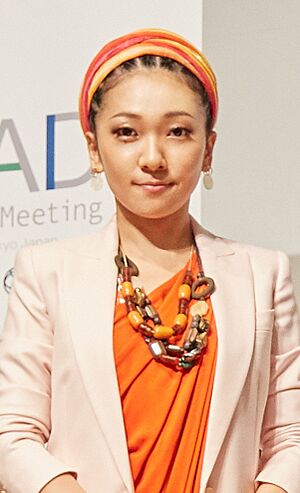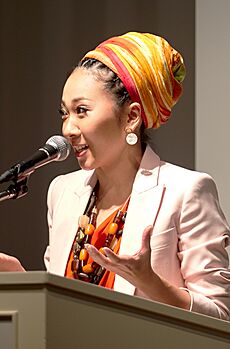Misia facts for kids
Quick facts for kids
Misia
|
|
|---|---|

Misia performing in 2018
|
|
| Background information | |
| Birth name | Misaki Itō |
| Born | July 7, 1978 Tsushima, Nagasaki, Japan |
| Genres | |
| Occupation(s) | Singer |
| Years active | 1997–present |
| Labels |
|
| Associated acts |
|
Misaki Itō (伊藤 美咲, Itō Misaki), better known by her stage name Misia (ミーシャ, Mīsha), is a famous Japanese singer and songwriter. She was born on July 7, 1978, in Tsushima, Nagasaki, Japan. Misia is known for her powerful voice and her music, which is a mix of R&B, pop, and soul jazz.
When she was 14, Misia moved to the city of Fukuoka to follow her dream of becoming a singer. She went to high school there and even started at Seinan Gakuin University. However, she soon left college to focus completely on her music career. In 1997, she signed a contract with the record label BMG Japan.
Misia has released thirteen studio albums and is one of the best-selling Japanese music artists of all time. She has sold over 20 million records. She is also famous for her amazing live concerts. In 2004, she became the first female singer to perform at all five of Japan's biggest stadiums.
Besides her music, Misia is also known for her work to help others. She is involved in many humanitarian causes, which means she works to help people in need and protect the environment.
Contents
Life and Music Career
How It All Began
Misia was born on July 7, 1978. Her parents were both doctors who loved music. Her father was a fan of jazz, and her mother enjoyed Western music. Misia grew up on the island of Tsushima, Nagasaki.
As a teenager, she wanted to learn more about music and get professional voice lessons. So, she moved to the bigger city of Fukuoka with her older sister. In high school, she joined the brass band and played the trumpet. She also started taking lessons at a music academy, where she learned about gospel and R&B from two American vocal coaches.
In 1997, Misia entered an audition for the record label BMG Japan. The company was looking for a new female R&B singer. She sang a song by her favorite band, Dreams Come True, and was chosen from about 3,000 people. This was the start of her professional music career, and she took on the stage name Misia.
Becoming a Star (1998–2002)
Misia released her first song, "Tsutsumikomu Yō ni...", on February 21, 1998. It was an instant success. Her first album, Mother Father Brother Sister, came out a few months later and quickly climbed to the number 1 spot on the music charts. It became one of the best-selling debut albums ever in Japan. For this album, she won major awards, including Best New Artist of the Year.
In 2000, she released her second album, Love Is the Message, which sold over 2 million copies. Later that year, her song "Everything" became a massive hit. It is one of the best-selling songs of all time in Japan.
In 2001, she got to work with her favorite band, Dreams Come True, on the song "I Miss You (Toki o Koete)". It was a dream come true for her.
New Record Labels and Big Tours (2002–2007)
In 2002, Misia moved to a new record label called Rhythmedia Tribe. She continued to release hit songs and albums. Her album Kiss in the Sky became her fourth number-one album in a row. This made her one of the few female solo artists to have such a long streak of successful albums.
Her songs were often used in movies and TV shows. For example, her song "Kokoro Hitotsu" was the theme for the movie Dragon Head. Another song, "Tobikata o Wasureta Chiisana Tori," was used in the PlayStation 2 video game Star Ocean: Till the End of Time.
In 2004, Misia went on a huge tour and performed in Japan's five largest dome stadiums. She was the first female solo artist to do this, and over 357,000 people came to see her concerts.
Global Recognition and Recent Work
In 2007, Misia returned to her first record label, BMG Japan. She held her first concert outside of Japan in Taiwan that same year. She continued to release popular albums like Eighth World and Just Ballade.
Misia's music has even been noticed by famous athletes. Ichiro Suzuki, a famous Japanese baseball player, used two of her songs as his walk-up music in 2008.
Over the years, Misia has toured all over Asia, performing in cities like Seoul, Singapore, and Hong Kong. She has also participated in international events. In 2010, she recorded the song "Maware Maware" for the 2010 FIFA World Cup in South Africa.
In 2012, she was invited to sing at the National Cherry Blossom Festival in Washington, D.C., celebrating the friendship between Japan and the United States. On July 23, 2021, she had the great honor of singing the Japanese national anthem at the opening ceremony of the 2020 Tokyo Olympics.
In 2020, she appeared on the popular Chinese singing competition show Singer, where she made it all the way to the finals.
Helping Others and the Planet
Misia is not just a singer; she is also a philanthropist, which means she works to help people and make the world a better place.
In 2002, she started getting involved in charity work. She visited countries in Africa like Kenya and Mali and started a charity called Child Africa. This organization helps children get a better education. Some of the merchandise sold at her concerts is even made by people in Kenya.
In 2010, the United Nations appointed her as an Honorary Ambassador for a special conference on biodiversity (the variety of life on Earth). To raise awareness, she started a website and sold special bracelets at her concerts, with the money going to support environmental causes.
She also started her own foundation called "mudef" (Music Design Foundation). The foundation's goal is to raise awareness about important global issues, like making sure all children can go to school and protecting the environment.
Discography
Misia has released many albums throughout her career. Here are her main studio albums:
- Mother Father Brother Sister (1998)
- Love Is the Message (2000)
- Marvelous (2001)
- Kiss in the Sky (2002)
- Mars & Roses (2004)
- Singer for Singer (2004)
- Ascension (2007)
- Eighth World (2008)
- Just Ballade (2009)
- Soul Quest (2011)
- Misia no Mori: Forest Covers (2011)
- New Morning (2014)
- Love Bebop (2016)
- Life Is Going On and On (2018)
- Hello Love (2021)
- Love Never Dies (2025)
Filmography
Misia has also lent her voice to animated movies. She was the Japanese voice for the character Meena, the shy elephant with a beautiful voice, in the movies:
See also
- List of best-selling music artists in Japan
 | Valerie Thomas |
 | Frederick McKinley Jones |
 | George Edward Alcorn Jr. |
 | Thomas Mensah |


